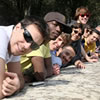Daniel Bourha, a young Cameroonian Catholic talks about his perilous two-year journey to reach Europe.
Daniel’s story begins at the end of 2014, when he went to visit his grandparents, who lived in the Far North of Cameroon. After two weeks there, war broke out and Boko Haram jihadists attacked the family village. “I had to flee to the Nigerian border, but little did I know, the situation there was even worse,” he recounts.
Continuing the journey towards areas he hoped would be safer, he headed towards Niger and stopped in Arlit, a town at the gates of the desert whose only resource is what lies beneath the sand – uranium. “It’s the last city where you have to pay to reach Algeria. Up until then, I was unaware of the dangers and didn’t feel too many problems. But everything changed in the desert”, he said.
He recalls a 5-hour journey through the desert in a pickup truck – 200 macabre kilometres where you see clothes and bones littering the arid ground. “By the grace of God, I arrived in Algeria. The smugglers took everything from us, I had no more money. We had to stay there and work to repay the money.”
In Tamanrasset, southern Algeria, he was able to finally get in touch with his parents, by creating a Facebook account. “My mother told me: ‘Do anything, but don’t cross the sea.'”
Daniel then headed to Oran, on Algeria’s northern coast, where he crossed paths with an Algerian from Nice. The latter hired him to renovate his apartment in Oran. He stayed there for two months, earning 1,200 euros.
When he saw that a friend of his had reached Germany in a very short time by passing through Libya, he decided to make to travel to the country too, although it was torn apart by a savage civil war at the time.
There, his hell began. “We walked for 10 hours to reach the first Libyan city. And there, it’s war, gunfire everywhere. In Tripoli, you see destroyed buildings like in a horror movie. I went straight to the seaside, where thousands of people had been waiting for two months to be able to cross. I stayed in that camp for nearly a month until it was attacked.”
He then went to the city of Tripoli to work – for a while with a Chinese company – and to feed himself. There, gangs imprisoned him in a house with 500 other people. He was finally ‘rescued’ by smugglers, who kept him hostage for several months, waiting indefinitely for the green light for the journey to Europe.
“In Tripoli, I met the smuggler again and told him that I am no longer afraid. I wanted my money or to leave immediately by boat. He made me a co-smuggler to help all those who arrived onboard. I found more than 5,000 passengers at sea for about fifteen boats that boarded at 7:00 p.m. for a crossing at midnight. A few people were missing, so I covered my head and took their place.”
The journey to Italy lasted one night. The boat arrived in Lampedusa the next day around 11:00 a.m. “I stepped off the boat and jumped into the water with joy. After a few weeks in Lampedusa in March 2016, we were set free on the island.”
Daniel was then transferred to Sicily, then to Genoa where there was no space. He was then left in Ventimiglia at the Franco-Italian border. He stayed there a month, before paying a smuggler 70 euros to travel to Nice, before taking a train to Marseille.
There, Daniel was quickly taken care of by Cimade, an association helping migrants. He considers himself “lucky” for his reception in Marseille, which allowed him to not have to sleep outside. Two days later, he was offered 9 months of training. He chose the gardening sector, and obtained a diploma.
Eight years later, married with two children, he has started his own landscaping business. From deserts to gardens, Daniel’s exodus has come to an end, and the darkest chapters of his book are past. (Delphine Allaire – VN)

